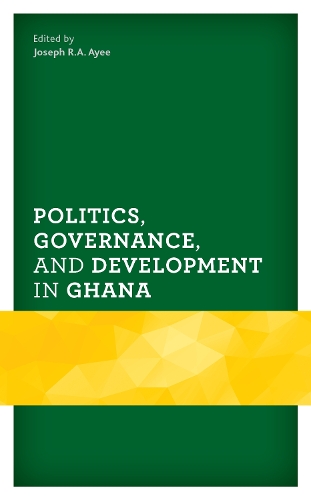
Politics, Governance, and Development in Ghana
(Hardback)
Publishing Details
Politics, Governance, and Development in Ghana
By (Author) Joseph R.A. Ayee
Contributions by Kwame A. Ninsin
Contributions by Emmanuel Siaw
Contributions by Alex K.D. Frempong
Contributions by Jasper Abembia Ayelazuno
Contributions by Lord Mawuko-Yevugah
Contributions by Hassan Wahab
Contributions by Nene-Lomotey Kuditchar
Contributions by Timothy Ba-Taa Banah
Contributions by Rosina Foli
Bloomsbury Publishing PLC
Lexington Books
16th October 2019
United States
Classifications
Professional and Scholarly
Non Fiction
African history
320.9667
Physical Properties
Hardback
374
Width 157mm, Height 239mm, Spine 33mm
753g
Description
Since it achieved independence in 1957, the West African state of Ghana has become the torchbearer of African liberation, as well as a laboratory for the study of endemic problems facing the African continent. In terms of democratic consolidation, the country holds a unique position on the continent as beacon of stability and democracy. Politics, Governance, and Development in Ghana takes critical stock of the landmark themes that have dominated its history since independence. The contributors address issues such as citizenship, civil society, the military, politicians, chiefs, transnational actors, the public sector and policies, the executive branch, decentralization, the economy, electoral politics, natural resources, and relations with Asia and the diaspora. These themes support mobilizing for Ghanas future, which is the theme for the diamond jubilee celebration of Ghanas independence. Edited by Joseph R.A. Ayee, this book will deepen the literature on studies on Ghana especially in the areas of politics, governance, economy and development; serve as a resource for academics, students, practitioners; and commemorate the diamond jubilee celebration of Ghanas independence.
Reviews
This well-written book brings together in a masterful way a collection of essay contributions on a wide range of governance-related issues in Ghana. The great strength of this book, which makes use of theory and practice, and draws on different academic disciplines and theoretical paradigms, is that it provides a timely and valuable contribution regarding the socioeconomic and political developments that have taken place in Ghana since its independence in 1957, and what next steps should be taken to ensure Ghana sustains its governance successes. The nuanced chapters provide overviews of several emerging issues and reorients our understanding on why despite challenges, Ghana has made great strides in maintaining its status as a success and model of good governance in Africa. Undoubtedly, the comprehensive accounts and explanations of governance in Ghana, and the knowledge and insights from the diverse perspectives should make it attractive to academics, policy makers, development agencies and development practitioners. -- Peter Arthur, Dalhousie University
Author Bio
Joseph R.A. Ayee is professor in the Department of Political Science at the University of Ghana.
